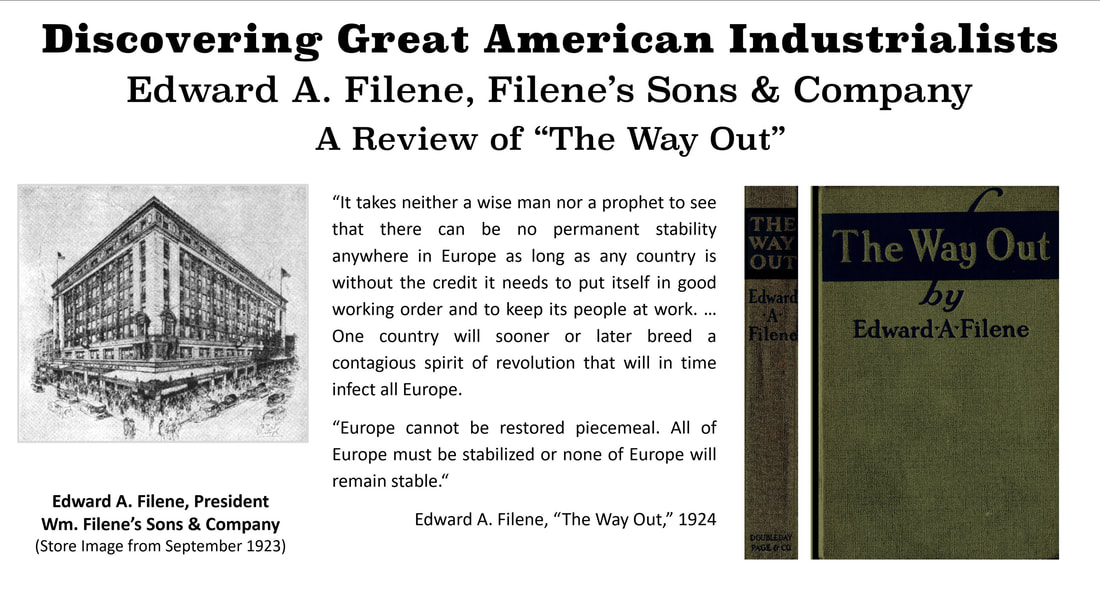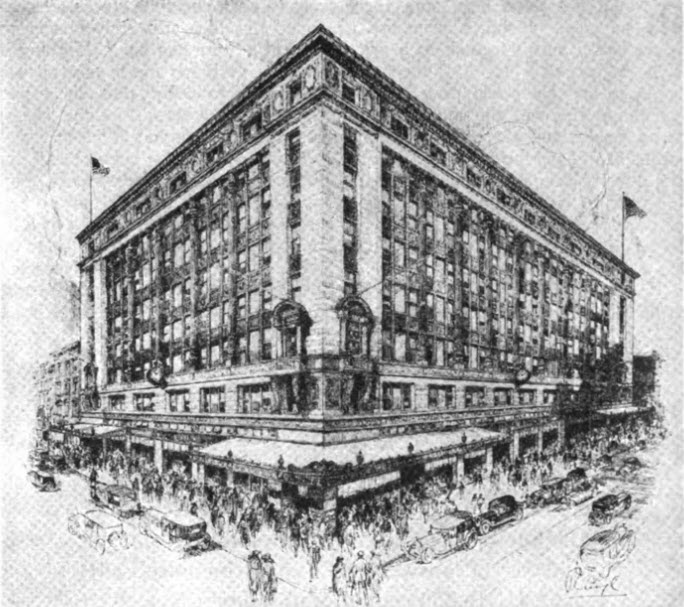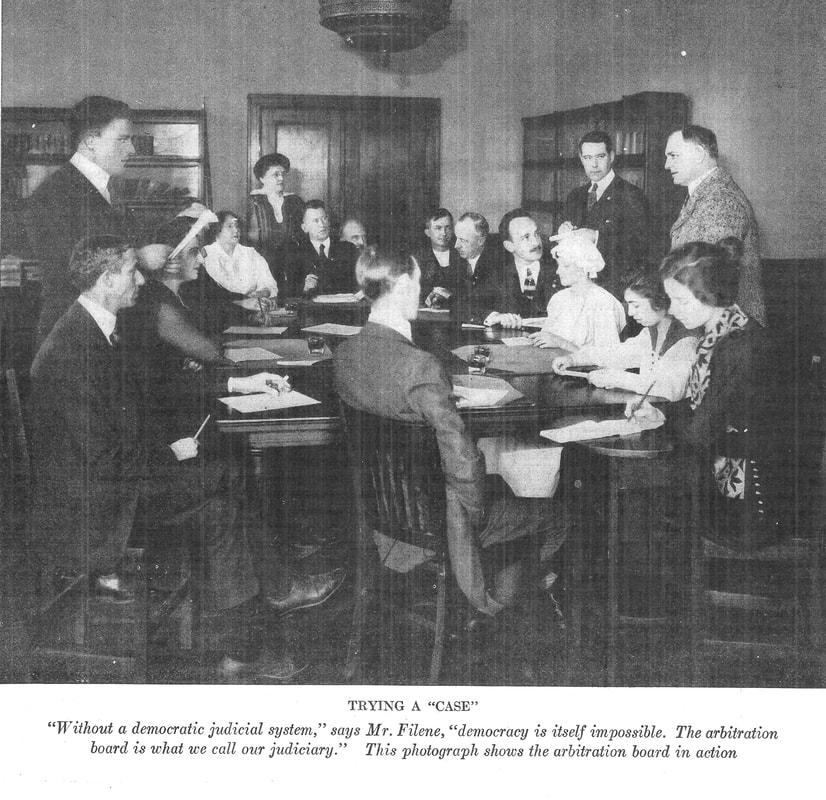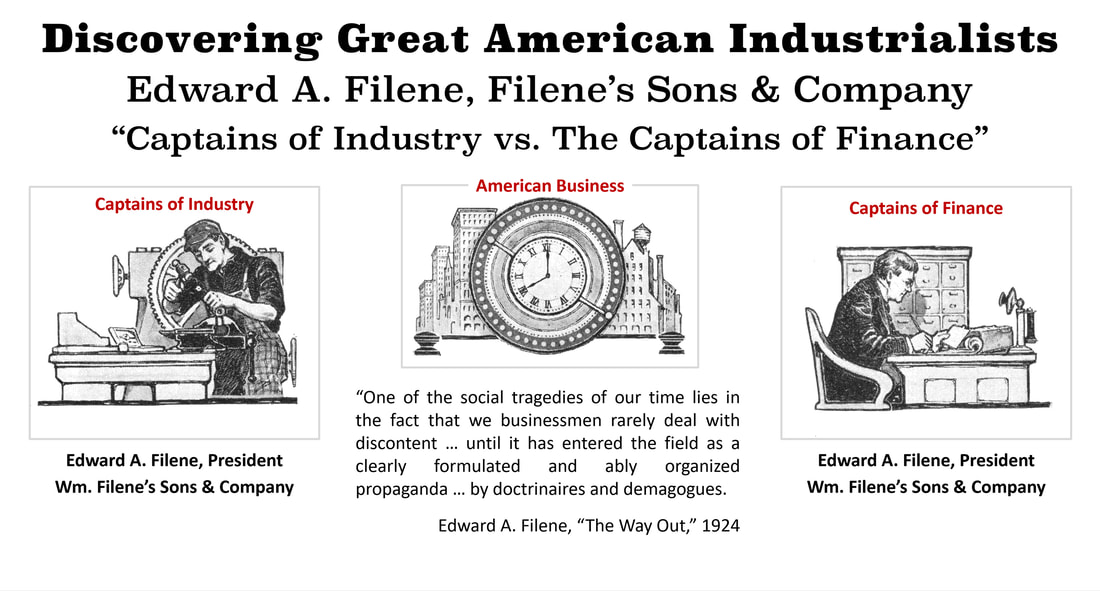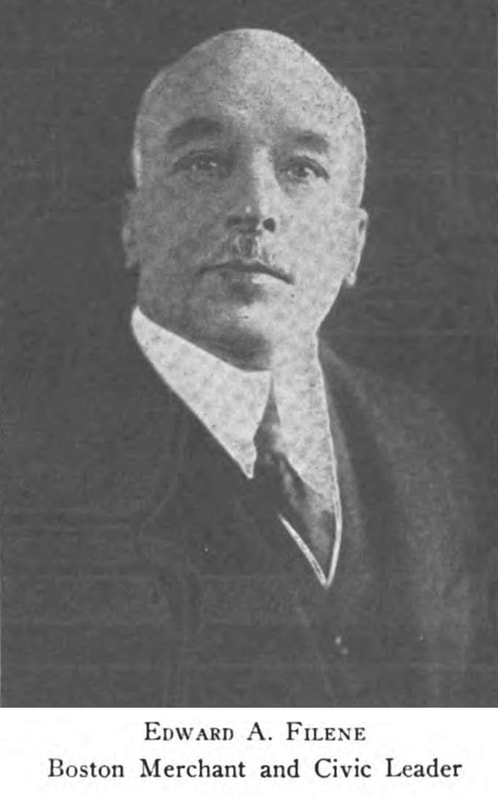A Review of “The Way Out” by Edward A. Filene
- Reviews of the Day: 1924–25
- Selected Quotes and Insights from “The Way Out”
- This Author’s Thoughts on “The Way Out” by Edward A. Filene
Reviews of the Day: 1924–25
|
Image of William Filene's & Sons from 1923
|
“Mr. Filene’s leadership in the business world is unchallenged, and in late years he has given much of his time to a study of industrial and social problems. … He hopes to find ‘The Way Out’ for business of the future. …How mass production and mass distribution are affecting every business. … How to meet the coming ‘tooth and claw competition.’ … How capital and labor can pull together … and why ‘Big Business’ is the best way out. …
“Advice of this character is something that cannot be bought. Mr. Filene offers it free to the public in the hope that younger men may attain the ideals in business for which he has striven but which were not to be attained in the time allotted to him.” “Editorial,” The Nashville Tennessean, September 8, 1925
|
“Edward A. Filene presents a forecast of coming changes in American business and industry. … ‘The Way Out’ impresses one as unusually suggestive, inspiring, clear-visioned, and farsighted. One may not agree with all that Mr. Filene says, but at least he makes the reader do a lot of thinking.”
Barrett Mann, “Reviews of the Latest Books,” The Pittsburgh Press, December 21, 1924
“The economic freedom Mr. Filene foresees will ultimately eliminate social and industrial unrest. …Which might give the impression that Mr. Filene’s book is theoretical—the work of a dreamer. It is not.
“It is reasonable, and logical, and convincing—and incidentally, it is pleasingly readable.”
“It is reasonable, and logical, and convincing—and incidentally, it is pleasingly readable.”
“Book Review,” The Emporia Gazette, April 1, 1925
Selected Quotes and Insights from “The Way Out”
|
“I have always thought that a business should rest upon a principle rather than upon a person.”
“We ought to stand on the shoulders of the men who have gone before us. Otherwise, we waste precious energy and blunder about in a rule-of-thumb, trial-and-error sort of business practice.”
“Of one thing I am certain: I shall not write an autobiography. … Biographers have a weakness for deification. But it is of no earthly use to anybody to learn that a god has done some difficult thing. I am interested only in repeatable performances.
“Biographies, I fear, stimulate awe more often than they stimulate ambition.” |
Selected quotes from "The Way Out."
|
“Over and over again I have found that when men begin to concern themselves with social justice in their businesses, they are tempted to use their good intentions as an alibi for business shortcomings. Social progress does not lie that way, and certainly business success does not. . . . We must realize that a good ethical sense is no excuse for a bad business sense. … Social progress is not helped by the business man who carelessly introduces all sorts of progressive social policies into his business and then ends up in the bankruptcy court.”
This Author’s Thoughts on “The Way Out” by Edward A. Filene
I picked up this book after reading Mr. Filene’s Successful Living in this Machine Age. This book, like Successful Living, was a most-satisfying read written by the famous retailer, and both are highly recommended by this author.
Although the book is an extraordinarily strong read from the first page to the last, the most insightful chapters were: “Captains of Industry vs. Captains of Finance,” “Democracy and Success in Business,” “Fordizing American,” “Counterfeit Wages,” and “Turning to Mass Production.”
The following offers a few insights from several of these chapters.
Although the book is an extraordinarily strong read from the first page to the last, the most insightful chapters were: “Captains of Industry vs. Captains of Finance,” “Democracy and Success in Business,” “Fordizing American,” “Counterfeit Wages,” and “Turning to Mass Production.”
The following offers a few insights from several of these chapters.
- Democracy and Success in Business
|
Edward A. Filene was a successful twentieth-century businessman. He was a peer, and a business associate of Tom Watson Sr. He was cited as a source of economic knowledge and business wisdom during the early twentieth century by the industrial and journalist communities. He constantly attempts to finding the middle ground between the reactionary extremists—those who see a threat in every new idea, and the revolutionary extremists—those who would, with no economic plan for the future, destroy any present infrastructure.
One of the most intriguing concepts that Mr. Filene writes about that is applicable today, is that of quantitative vs. qualitative democracy. He analyzes this from both a business and political perspective. In the end, he asks a most intriguing question about the quantitative and qualitative attainment of democracy: |
“Heretofore, the one big question about political democracy has been: How can we get it? How can we provide universal suffrage? How can we extend suffrage—the right to vote, so that everyone has a voice in governmental affairs [a quantitative problem]?
“But now that the right to vote has been made universal, the big question about political democracy is: What are we going to do with it [a qualitative issue]?”
Isn’t this the case today? In too many cases, aren’t we trying to right the quantitative democratic shortcomings of the past with qualitatively misguided re-actions in the present? His insights reach beyond just the business social community into the political as well. He writes of the twentieth century’s initial experimentations in industrial democracy: “I have seen the mass of workmen in a fairly democratized business insist upon going back and making all the mistakes that their leaders had made when they were younger.”
One of the strongest moments in the book is when Mr. Filene proposes his definition of “industrial democracy.” He observes that, “The first thing that impressed me in reading the results of research was the utter lack of any common understanding or common agreement upon the meaning of the term ‘industrial democracy.’ ”
He then provides his definition that the reader may find interesting:
One of the strongest moments in the book is when Mr. Filene proposes his definition of “industrial democracy.” He observes that, “The first thing that impressed me in reading the results of research was the utter lack of any common understanding or common agreement upon the meaning of the term ‘industrial democracy.’ ”
He then provides his definition that the reader may find interesting:
“To one man it [industrial democracy] means (1) merely an astute method of flattering employees into believing that they are consulted on policies without according to them any real power in decisions, to another it means (2) only extending the right of criticism to employees, to another it means (3) chaos and anarchy, and to another it means (4) a complete shifting of the ownership of industry from employers to employees.
“In short, it seems to mean anything from benevolent paternalism upon the part of employers to sweeping usurpation upon the part of employees. …
“When I use the term ‘industrial democracy,’ I mean that form of industrial organization in which the employees have (1) an adequate voice in the determination and control of the conditions of work, (2) an adequate stake in the results of work, and as near as humanly possible (3) a guaranty that the management of the business shall be efficient.”
Reading this chapter, I understood why Filene and Watson Sr. were such kindred spirits in organizations like the International Chamber of Commerce that they both attended, supported and lead. To read about Thomas J. Watson Sr.’s definition of “Democracy in Business” read this author’s article on the subject as provided here: [Democracy in Business].
- Captains of Industry vs. Captains of Finance
|
Mr. Filene’s chapter “Captains of Industry vs. Captains of Finance” is available on this website by following the provided link or selecting the image provided. This chapter supports a premise the author proposed a few years ago concerning twenty-first-century corporate leadership in his article “Capitalism Needs Industrialist-Minded CEOs.“
It appears this author was “standing on the shoulders of a man” who preceded him: Edward A. Filene. |
Select image to read this chapter from the book: "The Way Out."
|
It was humbling, but it was also encouraging to find verification of this author’s twenty-first-century article and statement of belief in such a successful, well-respected, twentieth-century industrialist leader.
- Fordizing America
|
Probably one of the most balanced perspectives on Henry Ford is provided in the chapter on “Fordizing America.” In this context, it is important to note that Edward A. Filene was Jewish.
Here is what he wrote: “So, by a Fordized America I do not mean an America dominated by Mr. Ford’s theories of public affairs, but an America dominated by certain of Mr. Ford’s theories of business affairs—specifically his principles of mass production, mass distribution, and his primary emphasis upon service to the consumer. … |
Picture from the April 14, 1922 issue of “The American Hebrew”
|
“So, I am going ahead with this consideration of a Fordized America simply because Mr. Ford has given us the finest demonstration to date of those principles of mass production and mass distribution. …
Only remember that it is Ford the producer and not Ford the publicist or politician who is meant.”
There is so much wisdom, truth and understanding in Mr. Filene’s statement, “It is one of the obligations of the intelligent to refuse to allow the minor errors of a man’s career to overshadow his real contribution to the life of his time.” This is a truly magnanimous observation! I wasn’t surprised that no review that I found mentioned this chapter—or used the term “Fordizing America.” It was a very touchy subject at the time.
Now, if our current leaders would study business history, and university professors could dependably teach these business principles with a contagious passion, the next generation might not repeat this mistake—that has already been repeated twice.
Our predecessors had broad shoulders. …
We should stand on them. …
Not ignore them.
Cheers,
- Pete
Now, if our current leaders would study business history, and university professors could dependably teach these business principles with a contagious passion, the next generation might not repeat this mistake—that has already been repeated twice.
Our predecessors had broad shoulders. …
We should stand on them. …
Not ignore them.
Cheers,
- Pete
